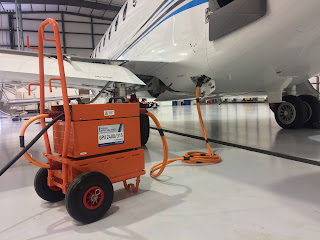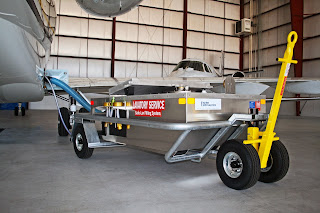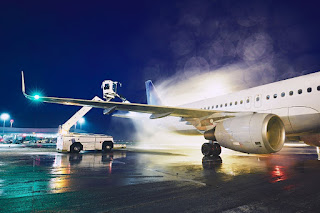Reducing Passenger Carrier Delays with Efficient Ground Service
In 2018 alone, the Federal Aviation Administration (FAA) estimated that passenger carrier delays cost $28billion between
direct costs to airlines and passengers, indirect costs, and reduced
demand. While some causes of delays may be unavoidable, such as weather, others can be mitigated or avoided entirely by improving the efficiency
of airside ground crew operations. Whether than means investing in an
upgraded aircraft pushback or tug tractor, or updating crew training and communication strategies, the payoff is clearly worth it.
Dependable Air Start Service
Aircraft ground power units (GPUs) see a lot of use on the airside, as aircraft start service is a must for any airport or FBO. The GPUs can go through a lot of wear and tear, between daily use and varying weather conditions, so reliability is a critical factor in efficient aircraft start service. GPUs should also feature easy mobility and handling to help crews work more quickly. Investing in GPUs that are compatible with the aircraft they’re provided power to should certainly be a priority as well. Underpowered or overpowered GPUs can both create problems that result in delays and safety concerns.
Reliable GSE Vehicles
The state of repair, age, and features of ground support equipment (GSE) vehicles in a fleet contribute directly to the time it takes to service and prepare an aircraft. A powerful, dependable aircraft tug or baggage tractor can reduce delays, especially if they feature modern safety innovations, such as an aircraft tug that can warn operators of impending overstress damage. Even for trained, experienced ground crew personnel, the stresses and variables accompanying their work present challenges. GSE vehicles with advanced safety features, user-friendly and intuitive design, high operator visibility, and reliable construction help ground crews work efficiently and safely. Reducing human error, stress, and vehicle technical issues on the airside is vital for preventing delays.
Ground Crew Telematics
The global aviation industry is massive and growing. That’s good news, but it also means more aircraft, more passengers, more GSE, and more personnel to operate and maintain everything. That means a correspondingly increased risk of mistakes, mechanical issues, congestion on the apron, and other potential causes of costly delays. As such, crew managers are increasingly turning to fleet telematics to improve safety, efficiency, and organization. Advanced modern telematics systems are capable of limiting operator use of GSE to authorized personnel, enforcing seatbelt use, and imposing speed control. Safety-enhancing features like that can reduce the risk of accidents on the ramp, thereby avoiding delays. Telematics systems can also organize and track GSE, provide maintenance schedules, and offer necessary checklists.
About AERO Specialties
AERO Specialties is known throughout the aviation industry as a reliable ground support equipment (GSE) provider with over 30 years of experience. The comprehensive catalogue of GSE products they provide is defined by innovation, leading-edge technology, and rock-solid reliability. AERO Specialties distributes GSE equipment with top-class performance, efficiency and emission reduction, safety, and reliability to their partners. Their partners include regional, private, military, and corporate aviation leaders at FBOs and airports across the world. Every member of the AERO Specialties team receives in-depth training on every piece of GSE to best assist you in selecting the right products. If your aviation business would benefit from the addition of a high-quality aircraft ground power unit, bypass pin set, LED marshalling wand, or any top-of-the-line GSE, choose AERO Specialties.
Update your GSE and streamline your airside operations with AERO Specialties, at Aerospecialties.com
 |
| Aircraft Ground Power Unit |
Dependable Air Start Service
Aircraft ground power units (GPUs) see a lot of use on the airside, as aircraft start service is a must for any airport or FBO. The GPUs can go through a lot of wear and tear, between daily use and varying weather conditions, so reliability is a critical factor in efficient aircraft start service. GPUs should also feature easy mobility and handling to help crews work more quickly. Investing in GPUs that are compatible with the aircraft they’re provided power to should certainly be a priority as well. Underpowered or overpowered GPUs can both create problems that result in delays and safety concerns.
Reliable GSE Vehicles
The state of repair, age, and features of ground support equipment (GSE) vehicles in a fleet contribute directly to the time it takes to service and prepare an aircraft. A powerful, dependable aircraft tug or baggage tractor can reduce delays, especially if they feature modern safety innovations, such as an aircraft tug that can warn operators of impending overstress damage. Even for trained, experienced ground crew personnel, the stresses and variables accompanying their work present challenges. GSE vehicles with advanced safety features, user-friendly and intuitive design, high operator visibility, and reliable construction help ground crews work efficiently and safely. Reducing human error, stress, and vehicle technical issues on the airside is vital for preventing delays.
Ground Crew Telematics
The global aviation industry is massive and growing. That’s good news, but it also means more aircraft, more passengers, more GSE, and more personnel to operate and maintain everything. That means a correspondingly increased risk of mistakes, mechanical issues, congestion on the apron, and other potential causes of costly delays. As such, crew managers are increasingly turning to fleet telematics to improve safety, efficiency, and organization. Advanced modern telematics systems are capable of limiting operator use of GSE to authorized personnel, enforcing seatbelt use, and imposing speed control. Safety-enhancing features like that can reduce the risk of accidents on the ramp, thereby avoiding delays. Telematics systems can also organize and track GSE, provide maintenance schedules, and offer necessary checklists.
About AERO Specialties
AERO Specialties is known throughout the aviation industry as a reliable ground support equipment (GSE) provider with over 30 years of experience. The comprehensive catalogue of GSE products they provide is defined by innovation, leading-edge technology, and rock-solid reliability. AERO Specialties distributes GSE equipment with top-class performance, efficiency and emission reduction, safety, and reliability to their partners. Their partners include regional, private, military, and corporate aviation leaders at FBOs and airports across the world. Every member of the AERO Specialties team receives in-depth training on every piece of GSE to best assist you in selecting the right products. If your aviation business would benefit from the addition of a high-quality aircraft ground power unit, bypass pin set, LED marshalling wand, or any top-of-the-line GSE, choose AERO Specialties.
Update your GSE and streamline your airside operations with AERO Specialties, at Aerospecialties.com



Comments
Post a Comment